Match making service for daughters who’ve lost a mother
When two women bonded after they lost their mums it led to the birth of a groundbreaking support service.
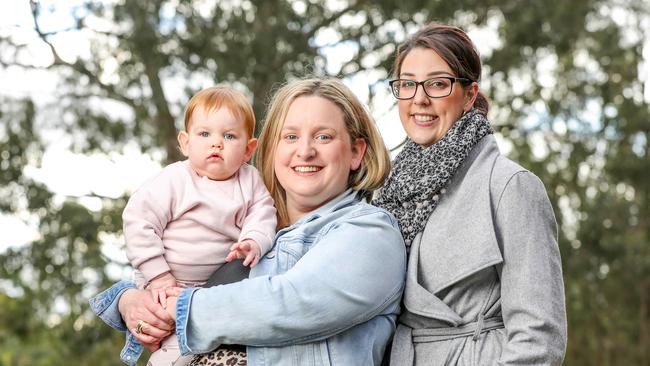
National
Don't miss out on the headlines from National. Followed categories will be added to My News.
It’s the group no one wants to join. But thousands of women taking part have had their lives transformed and are getting desperately needed comfort and support.
Born out of a life changing friendship Motherless Daughters Australia (MDA) offers support to girls and women whose mothers have passed away and five weeks ago it launched a groundbreaking matchmaking service.
Co-founder Danielle Snelling was aged 24 and struggling with the loss of her own mother Rosa when she put out a call on an international grief support site in 2013 hoping to meet someone the same age who had also lost their mother.
She met Eloise Baker-Hughes beginning a deep friendship that is now nine years long.
The 32-year-old teacher from Inverloch, Victoria was a bridesmaid at Eloise’s wedding and the bond between the two gave rise to an organisation now helping 5000 other daughters cope with the loss of their mothers.
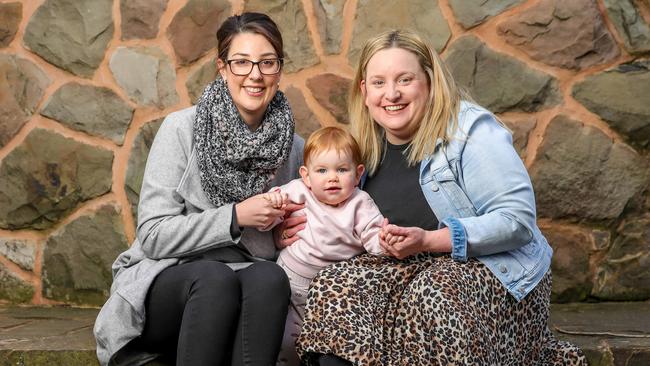
A few weeks ago MDA week launched ‘Friends in Grief’ – a match making service for grief support.
As part of the new initiative MDA is offering to connect women in the group who want to chat online or meet up with a woman who had either lost their mum in the same circumstances and or at a similar age to when their mother died.
Within four days 500 women signed up and filled out the questionnaire. It stopped at 500 because MDA had to hit the pause button so they had time to match women up using Google forms and excel spreadsheets that sorted participants into states and age groups.
The second round of Friends in Grief has now opened and the group has found almost 1000 women eager to connect with someone who knows what it’s like to lose their in similar circumstance or age.
“It’s kind of exactly how Eloise and I Met,” Ms Snelling said.
“We met in a cafe here in Melbourne and our similarities were uncanny. Our birthdays are a day apart, we were born in the same year, our mums are born in the same year, our dads are both tradies, things like that just formed the basis of such a beautiful and meaningful friendship that has now gone much deeper than having a shared loss,” she said.
The pair stayed in that cafe talking for five or six hours and there’s not been a day since that they haven’t spoken.
“From that day we thought, if this has benefited us so much and we felt so empowered and understood, there must be hundreds of other women in our shoes out there who might also benefit from a connection like this. So, we started MDA,” Ms Snelling said.
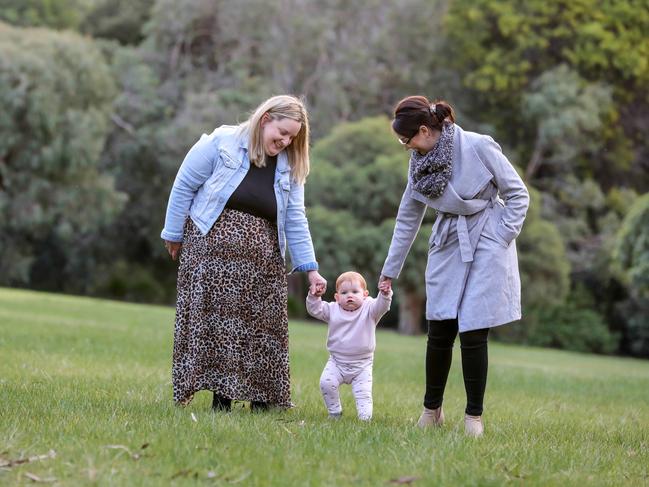
Thanks to a grant from pharmacy chain Priceline’s Sisterhood Foundation, Ms Snelling was able to quit working as a teacher and now works full time as executive officer for Motherless Daughter’s Australia.
The idea is “to create a sisterhood of support and understanding to support and connect women and girls whose mum's have died, to help navigate the everyday and life, milestones, without the support of their,” she said.
The group also runs High Teas on Mother’s Day in Melbourne, Sydney, Brisbane and Canberra with 160 women attending the event in Melbourne this year and it provides daily support through their Instagram and Facebook sites.
Nearly four million women in Australia have lost a mother including 2 million who lost their mum before the age of 44.
Research shows losing a mother at a young age can leave a person with a loss of identity, cause maladaptive coping mechanisms including substance abuse, increase the chance of being in a domestic violence relationship or suicidal ideation, Snelling said.
“It can be like living with a handicap,” Ms Snelling said.
Here are the stories of some of the women who’ve met courtesy of the new match making service.
ANNA GUILBERT AND NONIE SAWYER
Anna Guilbert was two weeks shy of her 18th birthday when she lost her mother Kerry Bell in 2017 and Nonie Sawyer was 18 when her mother Edwina passed away last November.
Both were on the cusp of embarking on the next stage of their lives after graduating high school when they lost the person they both describe as their best friend.
“It was earth shattering. She was my whole world. She was the glue that held us all together,” Ms Guilbert said of her mother who worked as an executive assistant at Gosford Hospital and lost her life to brain cancer at age 47.
Brain cancer slowly sucked the life out of Ms Guilbert’s mum and it meant “towards the end, finishing high school she wasn’t able to attend any of my, graduations, or, if I had a project I couldn’t ask for her opinion. There were lots of hospital visits and it was definitely exhausting,” she said.
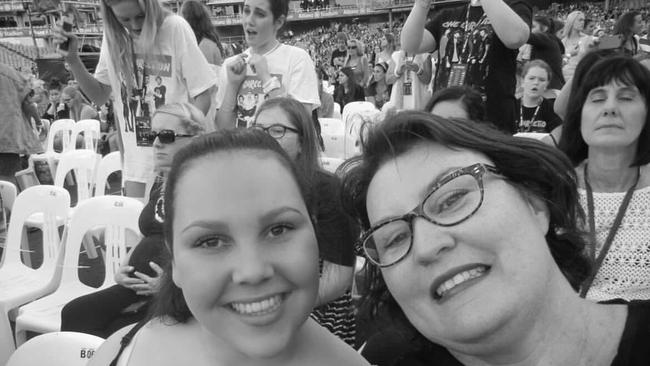
The Bathurst student would call her mother every day on her way to school and again every night, a mundane act most daughters take for granted that she can no longer do.
“All through December through to February was hard, not having mum for Christmas and then the anniversary of her dying in January and then, my birthday is in February so that kind of time of year, was always hard,” she said.
Nonie Sawyer’s mother had suffered polycystic kidney disease and had a kidney transplant before developing lymphoma which took the life of the 53 year old within three weeks of diagnosis.
“Because was sick, my whole life, it was something that we had talked about and we had prepared for in a sense, but it was a lot quicker than what I had expected it to be,” Ms Sawyer said.
“I always think about when one day I’ll become a mum not having her there to support me. I think that’s the biggest thing that probably weighs on my mind,” she said.
“You need her advice and her help with life events come up like changing jobs. You just wish you could have winge, have someone there to help make the hard decisions with”.
Sawyer who lives on Sydney’s Northern Beaches was in her first year of university and Covid-19 pandemic rules meant visits to see her in hospital were complicated by pandemic restrictions.
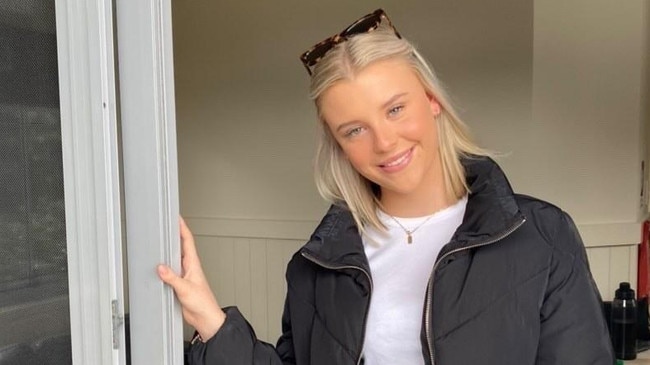
She clings to happy memories of the times they swam together at Manly Beach and a recent holiday to Hawaii.
Late in her life her mother switched careers from book keeping to become a wholistic funeral director, a move that inspired her family not to hold a funeral when she passed away but instead host a lunch where family members talked about their memories of her.
The pair stumbled across the Motherless Daughters group on social media and applied to be matched with a person of a similar age.
Since being paired they have emailed each other numerous times would have met in person if Sydney’s Covid restrictions had not come into force.
Ms Guilbert said one of the most powerful emails she received from Ms Sawyer was a question asking “Does the silence go away”.
“When you lose your mum there’s just this silence in your life from now on, you know, there’s no phone calls, there’s no opinions, there’s no anything. Yes, it’s the silence that hurts the most,” she said.
Both women are overflowing with gratitude for the support the group has given them and they look forward to meeting in person when the lockdown ends.
RHEE KENNEDY AND ALEX O’BRIEN
Rhee was 29 when she lost her mother Maryanne to melanoma in 2018 and Alex O’Brien was 28 when her mum passed away from breast cancer.
Maryanne’s death happened after five years of gruelling treatment including surgery, chemotherapy, radiation and immunotherapy.
“Because she had this battle for five years I think everybody was expecting me to expect her death but I just never believed she was dying,” Ms Kennedy said.
The now 31-year-old medical receptionist from Caroline Springs in Melbourne said when the nurse told her mum had 24 hours to live it was “mind boggling” and “devastating”.
“Obviously there was so much grief. But I think there was also a little bit of relief as well. It was just such a long journey for her and it robbed her of so many things, so I think I was tiny bit relieved that she was out of pain,” she said.
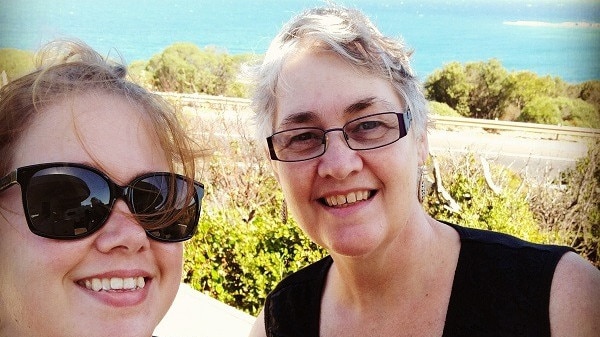
Ms Kennedy’s strongest memory of her mum is her good humour, “she used to talk for ages, she would have very good advice to give me, she was my biggest cheerleader. She was so wonderful,” she said.
“I was just so obsessed with talking to her I loved talking to her. I never got sick of talking to her, I guess, probably that’s the one thing that I miss is her voice, her presence”.
Although she benefited from strong support from a very close long term best friend she still felt no-one understood exactly the grief she was going through.
“It’s pretty much equivalent to, like throwing a ceramic plate against the floor and trying to just rearrange everything. I may still be a plate, but, you know, you can see so many flaws and chips and perhaps I haven’t got all the pieces back together,” she said.
A random Google search on mother loss led her to the Motherless Daughters group and she jumped at the chance to take part in their new friends in grief program.
When she got the first email response from her match Alex she felt excitement.
“For her to respond back and say, when my mum passed I was the same age, she also passed from cancer as well, it kind of like gave my heart a little bit of a bit of a flurry really because here is this person that really knows exactly what I was going through. It was amazing,” she said.
“The fact that they’ve taken the time to match us so perfectly. That’s just a measurable Thank you”.
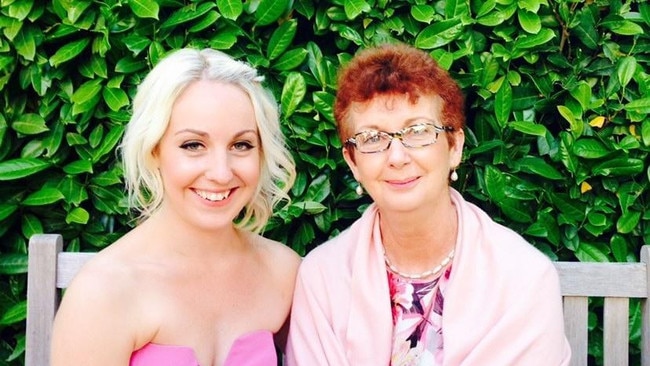
Alex O’Brien was 28 when her mum Peta passed away at home after her breast cancer returned for the third time and treatments stopped working.
“She was first diagnosed with breast cancer when I was 16 and of course it was a shock,” said the now 34 year old pharmacy technician from Hawthorn Melbourne.
“It was the day of my Year 10 formal. She insisted that I go to my formal. I was probably a bit naive, you know, more interested in hanging out with friends and getting dressed up,” she said.
Ms O’Brien pent hours on the phone to her mum every day “texting on the phone, on the loudspeaker in the car, you talk about absolute rubbish, or how much of a horrible day you had,” so the loss was devastating.
“It just changes the whole trajectory of your entire life, the person that you think you were going to be compared to I think the person that you end up being because you have this huge life experience,” she said.
“I remember thinking for months and months after mum died, everybody is just functioning around me, people just go along with their daily business and they don’t even know that you’re consumed by grief and sad and lonely and very angry. You just feel ripped off, I still feel ripped off”.
She found the Motherless Daughters group thanks to a message in the window of a local cafe where the group had thanked people for the money raised in a recent fund raiser.
She jumped at the chance to be matched with another woman of a similar age.
“Having someone similar experience I think it’s vital for your mental health, you feel so lonely, and you feel so isolated. And I guess, as the time passes, other people stop people stop checking on you people stop saying, how are you feeling?”
“Rhee has reinforced to me that it’s fine to have good days and bad days, just because five years has passed you don’t have to be over it,” she said.
Ms O’Brien’s mother loved Christmas and she has tried to keep her festive spirit alive cooking her “killer potato salad” and hams, prawns and the Christmas pudding.
“Christmas was huge. The decoration, the food, the days of preparing. So Christmas Day is hard, and I’ve tried to emulate her recipes and things since,” Ms O’Brien said.
“I would hate to think that I was if I stopped talking about my mum then nobody would ever talk about her
“If you stop talking, then people can forget. And I hate that. I would hate for anybody to forget who she was,” she said.
RIANNA ALBANO AND LUCINDA MICALLEF
Rianna Albano and Lucinda Micallef were both teenagers when their mothers passed away quickly and unexpectedly from cancer leaving them alone and forcing them to grow up quickly caring for their siblings.
“I was 17 when my mum died from cancer, Non-Hodgkin’s lymphoma, and she was 44,” Ms Albano, 37, said.
Doctors said it was the most curable cancer but within four months Sophie Micallef’s kidneys had failed and she was on dialysis, the cancer had spread to her bones “and then there was nothing they could do”.
“She didn’t want to leave, of course. No-one wants to leave their children behind. She was too young, she just she wasn’t ready. She should have had the chance to grow old and watch me get married and have children and succeed in life,” Ms Albano said.
“I would just have to reassure her that would be fine and, you know, don’t stress,” she said.
Sophie was a single mother supporting her three children by working as a legal secretary and when she was hospitalised Albano, who was in year 11, was given her credit card to take over the job of running the household.
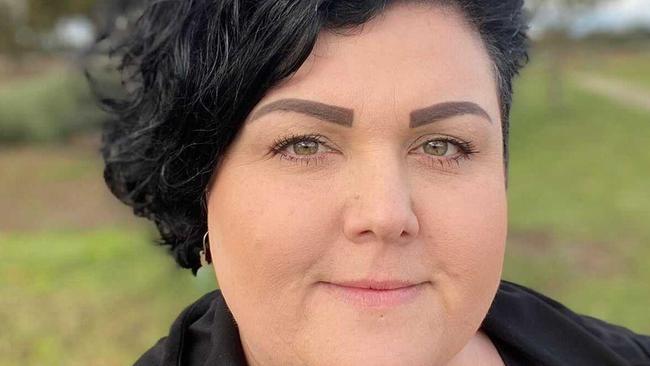
After her mother’s death her 21-year-old brother sold the family home to access his inheritance but under a provision in her mother’s will Rianna and her brother, aged 15, were unable to get their share until they turned 21.
“For a year after she died I was homeless. I was couch surfing and living in my car, I’ve slept on park benches,” she said.
“I went back to went back to TAFE and studied and worked at a pizza shop and when I turned 21 and got the money I bought myself a unit and went to school, went to uni and worked full time ever since”.
Unfortunately her younger brother went into a life of addiction and homelessness and her experience is one of the reasons she now works as a social worker with homeless people.
“He’s still battling it today. He’s never had any support or anything,” she said.
“I did feel like I lost myself when mum passed. I lost somewhere to live. I lost everything, my relationships with my brothers have never been the same.
“I grieve that she’s not here to share these special moments with me. And I grieve that my child doesn’t have a grandma, and that she wasn’t able to be a grandma. I still want to pick up the phone and ring her and say, come on Wednesday it’s grandma day at school,”.
Feeling isolated and alone and that no-one understood what she was going through Albano came across the Motherless Daughter’s group on Instagram.
It’s been an outlet for her to remember the good times and being able to post on birthdays and celebrations is ‘inspiring and it’s all validating”, she said.
“The one thing that’s hard is no one ever talks about them once they gone,” she said.
Ms Albano is moving from Melbourne to Townsville and the road trip through the Gold Coast will give her an opportunity to meet her new friend in grief Lucinda this weekend.
“I can’t wait to meet,” she said.
“We talk every day since we’ve been matched and it’s not just about mum stuff, just about life, we celebrate the small wins in life with so we promised each other that we would be that person”.
She said the birth of her daughter Iggy-Rose (now aged five) made her feel “like I was home again”
“I was able to find the expectations my mum would have of me being a mother,” she said.
“I never felt that love until I had my daughter and every day I tell her she’s my miracle and she was sent to me from heaven, from her grandma. She knows she, she points to the sky. And she’ll say my grandma’s in the sky”.
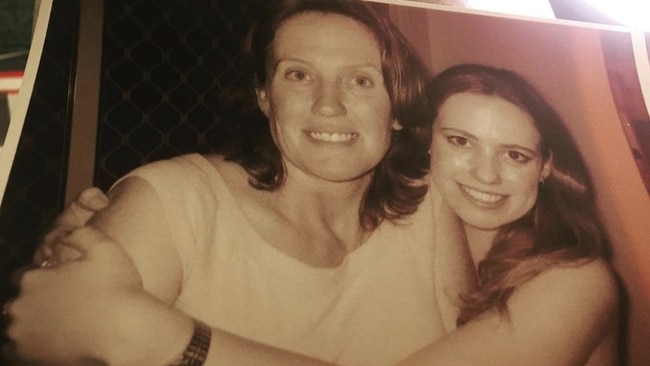
Lucinda Micallef’s mother Denise passed away just six weeks after being diagnosed with pancreatic cancer leaving her reeling.
Micallef was just 18 and in her first semester of a Human Services degree at university.
“I don’t think my brain could really understand and my younger sister, she was in bed with me for a year, every night crying,” the 33-year-old social worker from the Gold Coast said.
“There wasn’t any sort of any counselling offered because I was considered to be an adult”.
Watching friends post on social media about their mothers is hard
“Something goes wrong, like they have a bad day at work and they call their mum or they take their washing over, it’s almost like you feel like you’re living a completely different life when you lose a parent so young. Because you are on your own, you’re independent and you don’t have like a backup or a support system,” she said.
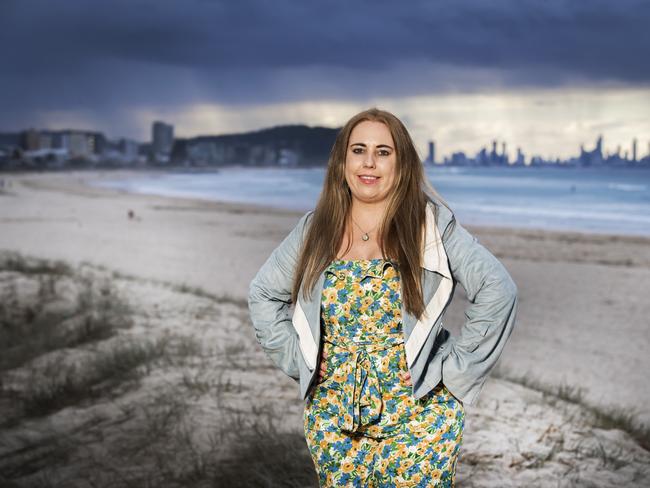
Micallef said the thing she misses most is the unconditional love of her mother, having someone to encourage her to hang in there when times are tough.
“Once that’s gone it does get quite lonely and you wonder am I, was I ever loved or was I cared about?” she said.
The friends in grief matching service has put her in touch with someone she has so much in common with.
“We just had so much in common, down to we were the same age when our mothers had passed away.
“She’s in the social work field as well, and we are into very similar things like essential oils, spirituality, nature. We were just flabbergasted and we were like, This is crazy,” she said.
“It was almost like our mum’s had just met in heaven,” she said.




